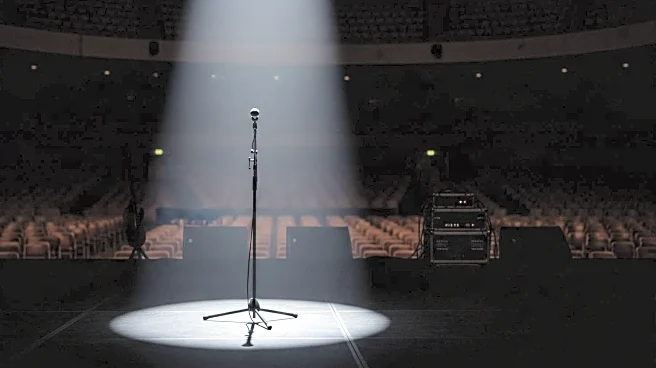What's Happening?
Singer D4vd has canceled several upcoming tour dates, including a concert at Los Angeles' Greek Theatre, as police investigate his connection to the death of a teenage girl from the Inland Empire. The girl's decomposed body was discovered in a car registered to D4vd earlier this month. The canceled events include a performance at the Greek Theatre scheduled for Saturday night, as well as other tour dates in San Francisco and Europe. Additionally, an event at the Grammy Museum in Los Angeles, where D4vd was set to perform and discuss his work, has been called off. The investigation centers around D4vd's ties to Celeste Rivas, who was reported missing in April 2024. Her remains were identified after being found in the trunk of a Tesla in a Hollywood tow lot on September 8.
Why It's Important?
The cancellation of D4vd's tour dates and the ongoing police investigation could have significant implications for his career and public image. The music industry often faces challenges when artists are involved in legal issues, which can affect their reputation and commercial success. Fans and stakeholders in the music industry may be concerned about the impact on D4vd's future projects and collaborations. The investigation also highlights the serious nature of the case involving Celeste Rivas, drawing attention to issues of safety and justice for missing persons. The outcome of the investigation could influence public perception and legal proceedings related to the case.
What's Next?
As the investigation continues, authorities may release further details about D4vd's involvement and any potential charges. The music industry and fans will be closely monitoring the situation to see how it unfolds and what impact it may have on D4vd's career. If charges are filed, it could lead to legal proceedings that may further affect his ability to perform and release music. Stakeholders in the music industry may need to reassess their associations with D4vd depending on the investigation's findings.
Beyond the Headlines
The case raises broader questions about the responsibilities of public figures and the impact of legal issues on their careers. It also underscores the importance of addressing missing persons cases and ensuring justice for victims. The situation may prompt discussions about the ethical considerations for artists and their management teams when facing legal challenges.










